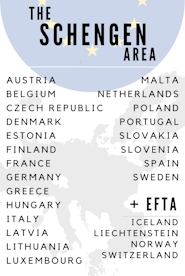
Call 0330 880 3600 Calls may be monitored or recorded. Opening Times.
- TRAVEL INSURANCE
- COVID-19 COVER
- More Options
- Help & Advice
- Existing Customers

Call 0330 880 3600 Calls may be monitored or recorded. Opening Times.

In short, European travel isn't all that different. There’s a couple of visa changes to bear in mind and you might need more evidence of your stay when it comes to border control and immigration laws, but as always it’s imperative that you do your research and don’t end up high and dry for a potentially silly reason.
Free Movement
So ‘free movement’ is what used to happen when we were in the EU. It basically meant that we could visit, work, live, and study freely in an EU country without a visa. And that people from other EU countries could do the same in the UK. Leaving the European Union has changed that, so if you want to be away for longer than a short-term getaway, there are now a few hoops to jump through.
Limited Periods Of Stay
You might have heard of the Schengen area. It’s a group of European countries who are all members of the EU, as well as Iceland, Liechtenstein, Norway, and Switzerland. If you’re planning a long-term trip to any of these countries which is longer than 90 days in any 180 day period, you’ll need to apply for a visa in advance. There are some EU countries though - Bulgaria, Cyprus, Croatia, Romania - that aren’t in the Schengen area, so visits to these places won’t count towards your 90 day total. If you’re no good at maths or calendars, you can use this calculator to work it all out.
The Common Travel Area
The good news is that Brexit hasn’t changed the travel requirements for British citizens travelling within the Common Travel Area. The CTA consists of Ireland, Jersey, Guernsey, and the Isle of Man, so the new passport and/or visa requirements won’t affect your trips to these places at all. As you were!
Passports
Brits travelling within the EU now have to make sure that:
So if you’re going on holiday from the 1st - 10th July 2024, your passport must have an issue date after 1st July 2014. It must also have an expiry date of 10th October, at the absolute earliest.
EES and ETIAS
There’s also this new system at the airport which is scheduled to go ahead later this year. Designed to help process travellers safely, quickly, and efficiently, the EES (Entry/Exit System) aims to fully automate getting your passport stamped.
EES is supposed to work alongside ETIAS, which stands for the European Travel Information and Authorisation Systems. Due to launch in 2025, UK and other non-EU travellers will have to complete a form and pay a one-off fee for a travel authorisation which lasts for a set amount of time. Upon arrival at EU borders, they will then have their data verified, fingerprints and/or photo taken, and be asked a set of questions. Passports will be scanned, and biometrics checked before entry to the country. All quite high-tech isn’t it?
Border Control
When you’re going through border/passport control at the airport, you won’t be able to use the lanes for EU or EEA citizens, unless you’re a family member of an EU/EFTA citizen. This means you’ll probably need to join the ‘non-EU’ or ‘third-country’ lanes. Bear in mind that these new border check procedures can lead to longer waiting times than we’re used to.
Your passport will be stamped both on entry and exit to make sure you don’t go over the 90 day stay limit. Other information required by border officials abroad might now include the following:
For country-specific guidance about entry requirements, it’s best to check the FCDO’s travel advice pages.
Health Cards: EHIC or GHIC
Your EHIC card will remain valid until its expiry date. After that, you’ll have to apply for a replacement GHIC card for free online. Check out our blog post for more information.
Driving In The EU
The rules for driving will vary from country to country, so make sure you check the FCDO’s advice for country-specific advice. In any case, you’ll need to do the following:
Data Roaming
You’ll need to check with your tariff provider to see if they’ve changed their EU-roaming costs. Some major providers have said that Brexit will not change their charges at all, although others have not specified this.
Taking Your Pet Abroad
Unfortunately you can’t use your pet passport anymore, and will now have to apply for an Animal Health Certificate (AHC). Speak to your vet at least one month before travelling to arrange this, and make sure your pet is microchipped, vaccinated, and has the relevant available treatments to travel within the EU.
BY HOLLY GARWOOD, 8TH APRIL 2024
Sources:
Travelling to Europe following Brexit | ABTA
After Brexit: Visiting, working and living in the EU | House Of Commons Library
Brexit Travel Advice - Will Brexit Affect Travel Plans | Expat Explore